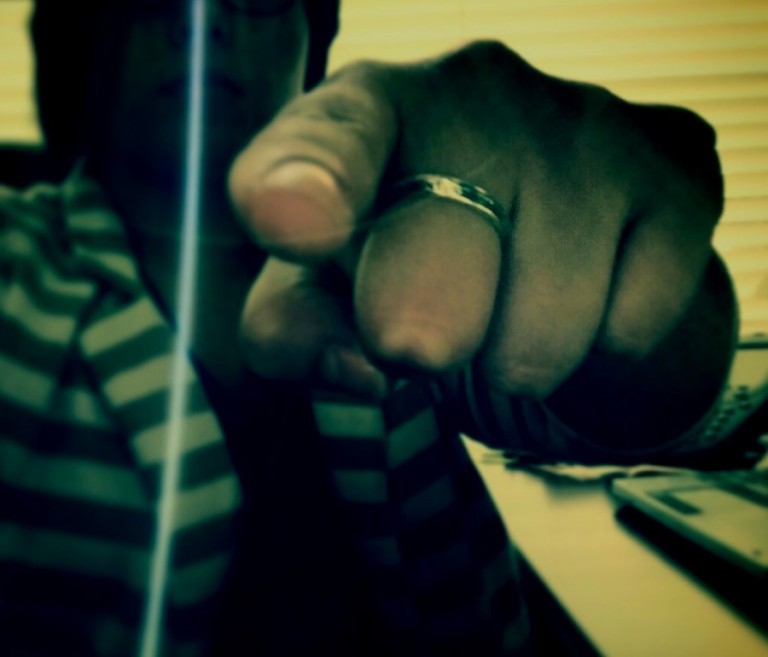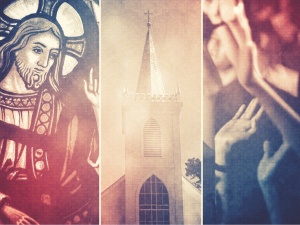Though Lent is often uncomfortable by its nature, I felt particularly uncomfortable this Lent. There’s been a lot going on for me as far as reading, travel, and processing discoveries. In the midst of all that, I’ve been preaching every other week at a midweek service, guided by the selected passages and main themes in Adam Hamilton’s 24 Hours that Changed the World. One of the weeks I got to preach the title was ‘Condemned by the Righteous,’ the passage was, in part Mark 14:53, 55-56, 61-65:
They took Jesus to the high priest; and all the chief priests, the elders, and the scribes were assembled. . . . Now the chief priests and the whole council were looking for testimony against Jesus to put him to death; but they found none. For many gave false testimony against him, and their testimony did not agree . . . The high priest asked him, “Are you the Messiah, the Son of the Blessed One?” Jesus said, “I am; and ‘you will see the Son of Man seated at the right hand of the Power,’ and ‘coming with the clouds of heaven.’ ”Then the high priest tore his clothes and said, “Why do we still need witnesses? You have heard his blasphemy! What is your decision?” All of them condemned him as deserving death. Some began to spit on him, to blindfold him, and to strike him, saying to him, “Prophesy!” The guards also took him over and beat him.
All of the passages have been from Mark, which has been interesting because I took a class specifically on Mark in seminary. In Mark things happen fast and even abruptly, and now we’ve entered the passion narrative, a critical piece where Mark places much emphasis. We began our look at Jesus’ final 24 hours beginning with the last supper, followed by his time of anguished prayer in the garden, and now he is betrayed with a kiss from one of his close friends, and abandoned by the rest of his disciples. Jesus was arrested in secret and with no grounds, made to walk under arrest, placed in a dungeon-ous pit and accosted by the pillars of the community for hours.
“The God of the universe chose to walk in human flesh as an itinerant preacher, teacher, carpenter, healer and pauper. He came as one of us. He healed the sick, forgave sinners, showed compassion to the lost, and taught people what God was really like. We must not miss the irony here: It was not the “sinners” who arrested God when he walked among us. Those who took him into custody and tried him were the most pious and religious people on the face of the earth. The God they claimed to serve walked among them in the flesh, and they could not see him. They were so blinded by their love of power and their fear of losing it that they missed him.” –Adam Hamilton in 24 Hours That Changed the World, p. 48.
How could this happen? How could the most pious men in the community, the persons who everyone thought of as being the most dedicated to God do this? Not only because it was God, God-self — but because even if they didn’t think he was the Messiah, why would they spit on, mock, abuse, and sentence to death an innocent man? How does that happen?
This passage is not new to me and yet this year I’ve seen it anew. It has convicted me. It has brought up many questions for me. And though I often think of the church with the subtitle of ‘Adventures in Missing the Point;’ I don’t believe that is solely the case here. To me, this is an example of what fear can do to people.
I finished reading the book ‘The New Jim Crow’ recently and I was beside myself upset over this book and its revelations of mass incarceration, the overwhelming high percentage of blacks who get put in jail. and the history behind discrimination regarding voting, and other things. I had conversations around for-profit prisons and detention centers. What struck me the most is that some of the language in the book was the very same language that someone accused me of not too long ago while discussing immigration. Things like “the breakdown of law and order…” Fear!
“Fear performs its poisonous work within all of us. How often are we still motivated by it? In what ways does our fear lead us, individually and as a nation, to do what is wrong–what is at times unthinkable–while justifying our actions as necessary?” (p. 50). These righteous men feared Jesus because peple liked him and that put insecurity in them and their roles. They feared losing power or status. Who knows all that they feared. I must ask, would I be found among those who out of fear and insecurity sentenced an innocent man to death? How would my decisions be different if I asked myself not “What is the thing that will make me feel most secure?” but “What is the most loving thing for me to do?” (p. 51) As much as I want to condemn these men, judge them, and proclaim that I would do no such thing, I can’t say that with certainty. I can’t say that with certainty because we have… we have done the same.
What are some examples? Between 1885 and 1967, approximately 49,000 homosexual men were convicted of gross indecency under British law and many forced into chemical castration. In addition to current mass incarceration and existent systematic racism, the old Jim Crow laws in past are good examples. The Holocaust, apartheid in South Africa, and so on. All things that I think in part were flamed by fear. Fear of the unfamiliar. Fear of losing power. There are many different kinds of fears. But in addition to these examples that are on more massive scales, I wonder about the things in our lives specifically.
Soldiers, religious persons and mobs end up murdering God’s son. Whether under the guise of following orders, or good biblical values, or standing up for law and order, or all of the other excuses people give for doing nonsensical things, injustice is seemingly justified. When have I let my fears cause me to behave unjustly – whether by action or inaction. We are not told that any of the religious individuals involved in Jesus’ trials spoke up… not one. When have I remained silent in the midst of injustice? It doesn’t have to be something spectacular or newsworthy — injustice occurs in many times and places — be it in our jobs, our homes, schools, the places we shop for food (even the very food we buy) or other places we pass through.
These are the things that I have been pondering. As we remember this day the injustice that was the cross, may we not only remember how we are complicit in it, but how we are complicit in other injustices even today.
Let’s pray:
Lord Jesus Christ, you became weak so that we might be strong; you poured yourself out so that we might be filled; your body was broken so that we might be fed; you died upon a cross so that we might live. And yet your ways are not our ways. Save us from our strengths. Place within us a hunger for righteousness and a thirst for justice. Remind us that in giving we receive. Keep us near the cross, a sign of judgment and hope, of forgiveness and new life. Amen. (Kenneth H. Carter, Just in Time! Prayers and Liturgies of Confession and Assurance, Abingdon Press.)

